Streamlined Brexit rules see the return of British workers to the Alps this winter
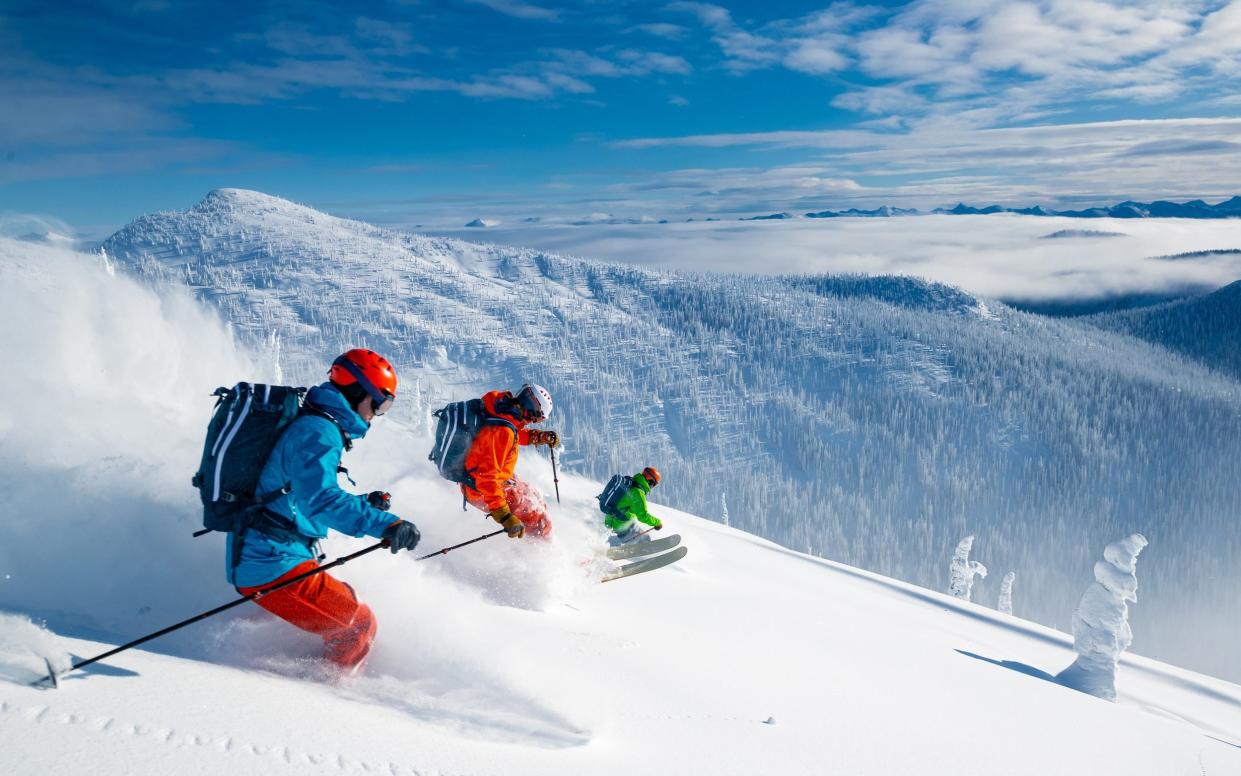
Spending the winter working in a ski resort will be easier for Britons this year, following the streamlining of the hefty post-Brexit employment process.
Working in a ski resort has long been a rite of passage for ski-mad Britons. As inventors of the catered ski chalet holiday, it’s been British workers who have staffed these chalets for decades, as well as many of the bars and nightclubs in Alpine resorts popular with UK holidaymakers.
After Brexit, the legal requirements surrounding the hiring of British staff to run chalets, bars and fulfil other hospitality jobs in Europe was off-putting for most companies and potential employees, taking several months and costing nearly £1,000 per person.
But both the time and cost have now been virtually halved thanks to extensive lobbying by Seasonal Businesses in Travel (SBIT), the trade body that represents seasonal UK travel businesses, with the cooperation of their partners in the French administration.
“We want to get the message out to potential chalet staff that they can and should apply for work in the French Alps again,” said Charles Owen, managing director of European Pubs — which owns venues including Jacks Bar and Copiña in Méribel — as well as Director of SBIT.
“I will be employing British staff in my businesses for this winter.”
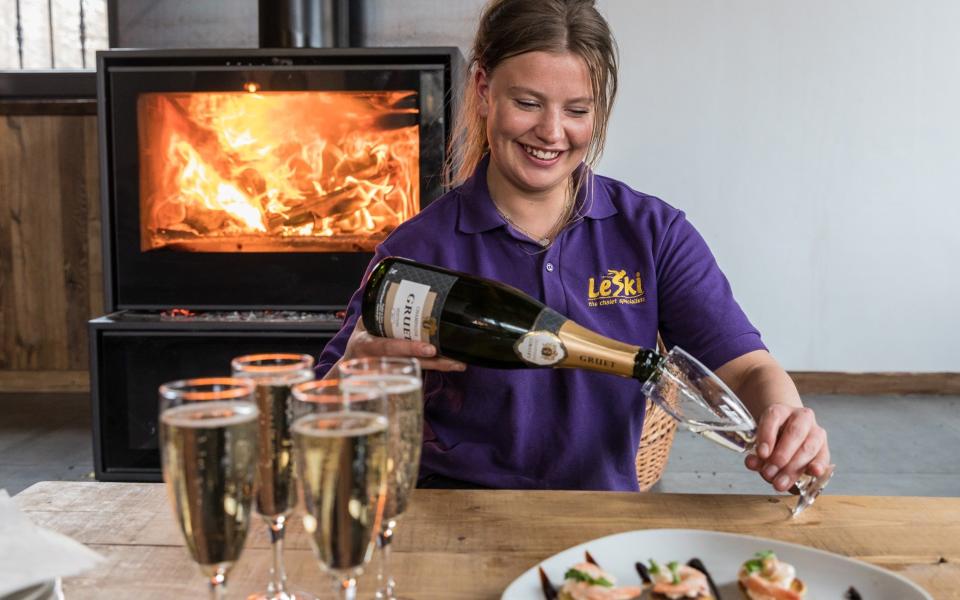
Ceri Tinley, managing director of luxury chalet brand Consensio, only hired EU passport holders for several years after finding the work permit/visa process long, complicated and expensive for UK passport holders after Brexit.
But now, Tinley said UK applicants are being considered again. “The procedure is very much more simplified thanks to SBIT,” she explained. “Also, many UK staff now have got their Carte de Sejour Pluriannuel from previous seasons so we only need work permits for them, which is very straightforward.”
But the costs and complications of post-Brexit red tape have taken a toll. A 2023 report produced by SBIT and ABTA found there has been a 72 per cent reduction in the number of UK staff employed in the winter season in France since 2017, with many companies either reducing their chalet numbers or closing entirely due to the increase in costs and financial impact of the pandemic Some of the most recent casualties include Powder White, Esprit Ski and Alpine Action.
Here’s everything you need to know if you’d like to fulfil your dream of being a seasoniare this winter.
Will Britons be able to work in ski resorts this season?
Yes. It’s not as simple as it was before Brexit, but the turnaround for a 90-day work permit is now a month (it was previously up to three months with no guarantees). Once in resort, an employee can apply online for what’s called a “Carte de Sejour Pluriannuel” in France. This type of residency allows the holder to work six months of the year for three years and involves just one visit to the local council (previously three). Thankfully, bone-fide employers handle most of the paperwork.
“SBIT has been running courses for members explaining the process so they fully understand,” explains Charles Owen. “But some companies are still flouting the rules and seasonaires should beware — if you don’t have the right paperwork you could face deportation and have great difficulty entering Europe again. It’s best to work for a company that is a member of SBIT.”
What impact have Brexit and coronavirus had on seasonaire jobs?
Before Brexit, France and Austria clamped down on working regulations, including enforcing a cap on hours, decent rates of pay and legally required days off. After applying the rules loosely for many years, many British companies were forced to tow the line, changing working procedures and increasing headcounts. After the UK left the EU on January 31, 2020, seasonal ski staff could no longer be hired under the Posted Workers Directive in EU nations, so Britons were left applying for permits for jobs in a similar way to those in Australia, the US and Canada.
“We believe there were 8,000-10,000 seasonal workers in France before Brexit, and in the past couple of years there has been a 72 per cent drop in the workforce,” says Owen. “But through Covid and Brexit a number of operators either folded or reduced their offering dramatically, so the chalet offering has been slashed and, while SBIT has halved the costs and time in the application process, overall there are far fewer jobs available.”
He adds: “Most importantly, watch out for companies who don’t obtain the correct paperwork now required or are paying their staff peanuts, they are likely to be flouting the rules and risking everyone.” SBIT will soon be posting on its website guidance as to what seasonaires should look for in an employer when applying for jobs in the EU.
In non-EU Switzerland, British worker rights have remained the same throughout – all that is required is a UK passport, address and national insurance number to be granted a four-month winter season work permit (which does not count towards the 90 tourist days in the Schengen zone).
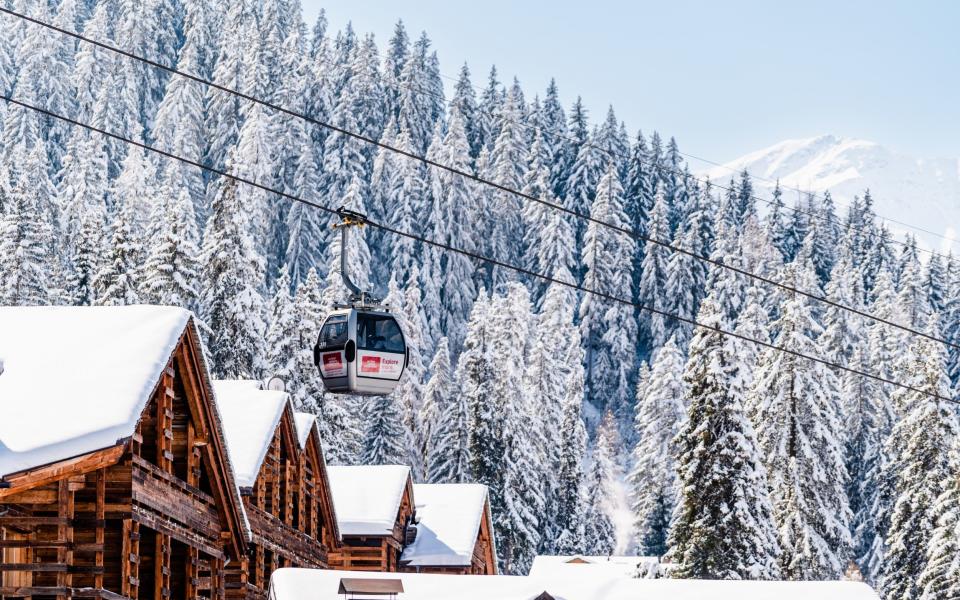
“Working for a British chalet company in Switzerland is far easier than it is in the rest of the EU. This is because the Swiss and UK are working much closer together since Brexit. It was one of the first post-Brexit trade deals we signed, and we are in the process of negotiating an even tighter new trade agreement as well,” says Tom Avery, founder of Ski Verbier Exclusive, a chalet operator in the Swiss resort, which recruits 60 seasonal staff during the season.
What does this mean for my holiday?
The good news is that there are still chalet operators employing British staff, so the concept of the catered chalet wih English-speaking hosts serving champagne, teaching your children to bake cakes and enjoying a joke with you at après, is still available in all the major destinations in France, Austria, Italy and Switzerland.
However, there are fewer chalet options than ever before and you might hear more Irish and Dutch accents around — two English-speaking countries who currently have pick of the ski job market.
Words by Abigail Butcher
The jobs
Chalet host
A picture of an acne-ridden, nervy school leaver accidentally burning an apple crumble may jump into your mind with the words ‘chalet host’. However, in truth this is a highly skilled role especially with the increasing level of service offered by many chalet operators – although there is nothing wrong with being an 18-year-old host, guests’ expectations are high and cooking a good quality three-course dinner, plus canapés and afternoon tea in some cases, for 10 to 20 guests each day is no mean feat.
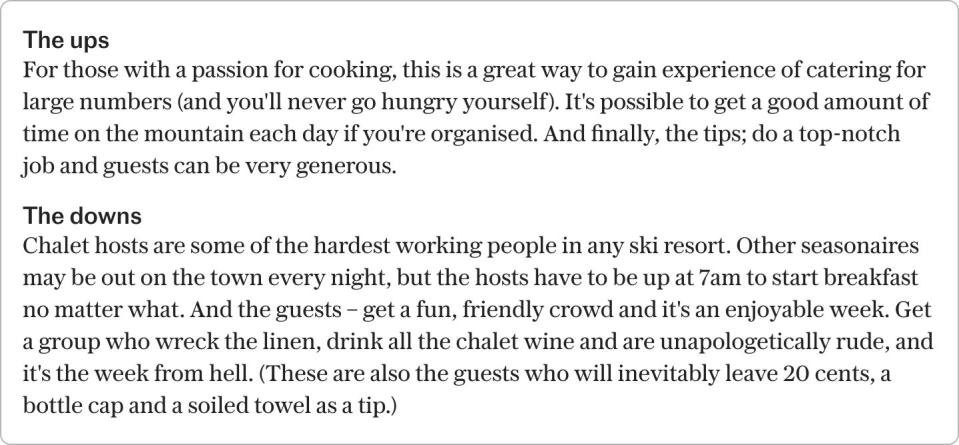
Resort rep
The rep’s job is to be a point of contact for the guests in case they have any questions or problems. It starts with the transfer from the airport into resort, during which reps often sell lift passes, equipment hire and lessons. During the week, the rep will call in on their guests regularly or have an allotted time or place where guests can drop by to see them – be prepared to be an encyclopedia of information and a fast-acting problem solver.
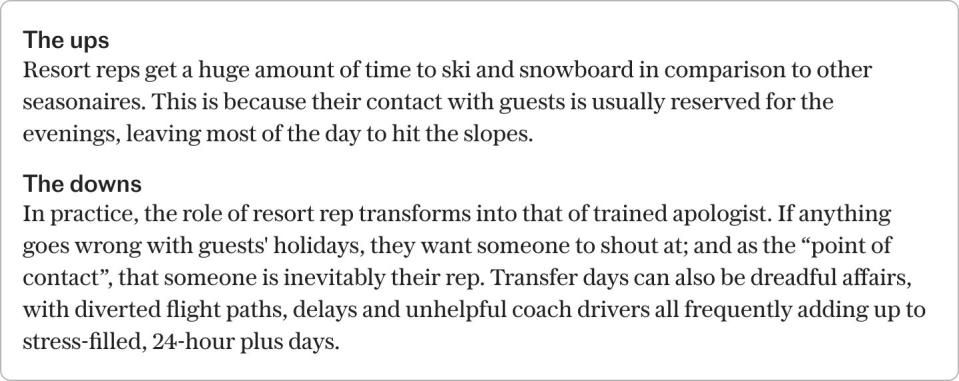
Nanny
Childcare is a big job in the mountains – parents want to enjoy the slopes, safe in the knowledge that their little angels are in good hands. Family specialist tour operators like Esprit Ski, The Family Ski Company and Ski Famille have a range of childcare options, including evening babysitting services. Companies will usually require some level of childcare qualification.
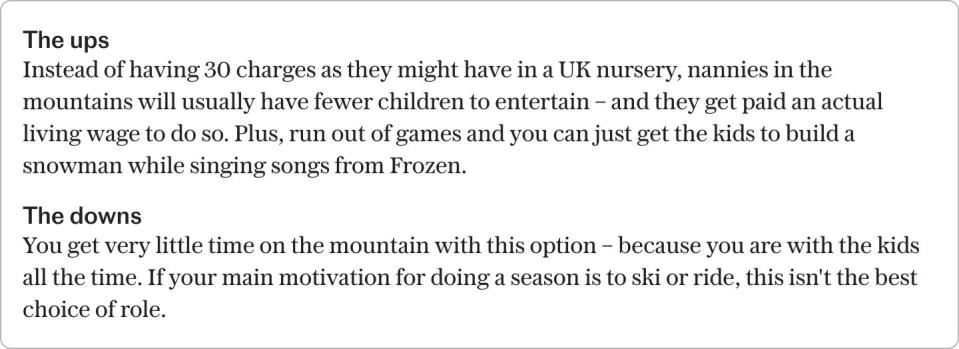
Bar tender
This is one of the most sought-after roles in a ski resort – possibly because of the opportunity it affords to drink for free. Bar experience is essential as resort bars can get extremely busy, and confidence when speaking with customers and a working knowledge of the language are both handy.
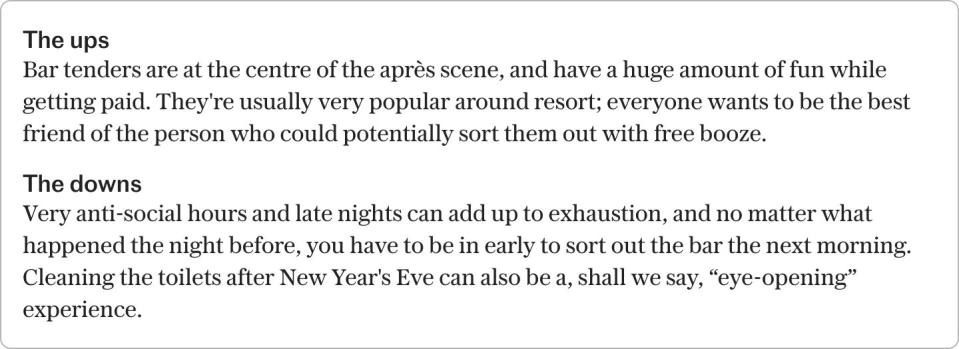
Plongeur
This is the infinitely more sophisticated term for a KP, or washer upper. The general kitchen dogsbody, a plongeur washes up, dries up and generally helps with anything menial that needs doing in the kitchen.

Ski bum
A ski bum does exactly what s/he says on the tin – this is a skier or snowboarder who bums around resort for the season. They don’t let something as irritating as a full-time job get in the way of hitting the slopes. This lifestyle can be executed well or poorly, depending on an individual’s luck, charm and chutzpah.
The companies
As you might expect, the big tour operators, such as Crystal Ski, Inghams, Neilson or Skiworld, are the ones with the most jobs available – however as detailed above even they have been forced to look for local talent out in resorts. For those jobs that will be recruited in the UK, the benefit of working within a larger organisation is that there’s a clear chain of command; there’s always someone to refer up to if things go wrong, and you can work as part of a big team if that’s what you feel most comfortable with. There’s also the added bonus of having a greater choice of destinations, as these tour operators work in a wider range of resorts – although many have shrunk their offerings in recent years.
Smaller, more bespoke companies offer a different, but equally attractive experience. Working for a more niche organisation, such as Le Ski or VIP Ski, can feel more personal – as if you’re a very important part of the company, rather than a cog in a much bigger machine.
Watch out for gap year programmes that charge applicants hundreds, or sometimes thousands, of pounds to secure a job in a ski resort – you can have the same experience by getting a job through a reputable company, without having to pay for the experience.
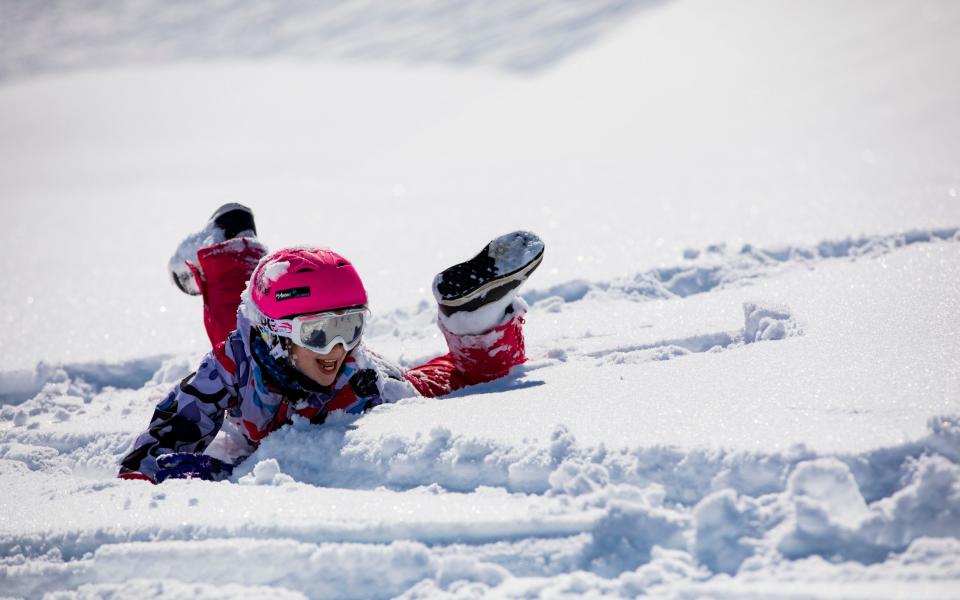
The resorts
Do some research before you go. There’s a world of difference between a traditional party resort (such as St Anton or Val d’Isere) and a family resort (such as Flaine or Les Menuires), a small, quiet village off the beaten track (such as Adelboden or Champoluc) and a sprawling French mega-resort spread over several bases (such as Les Arcs).
If you like the idea of independence, look at smaller resorts where you will be part of a select team with more autonomy. If you’re looking to have lots of support, bigger resorts will probably have a more sizeable team to slot into.
Tour operators will often let you express a preference, so go armed with the knowledge of your favourites – check out our guide to finding the perfect ski resort for you.
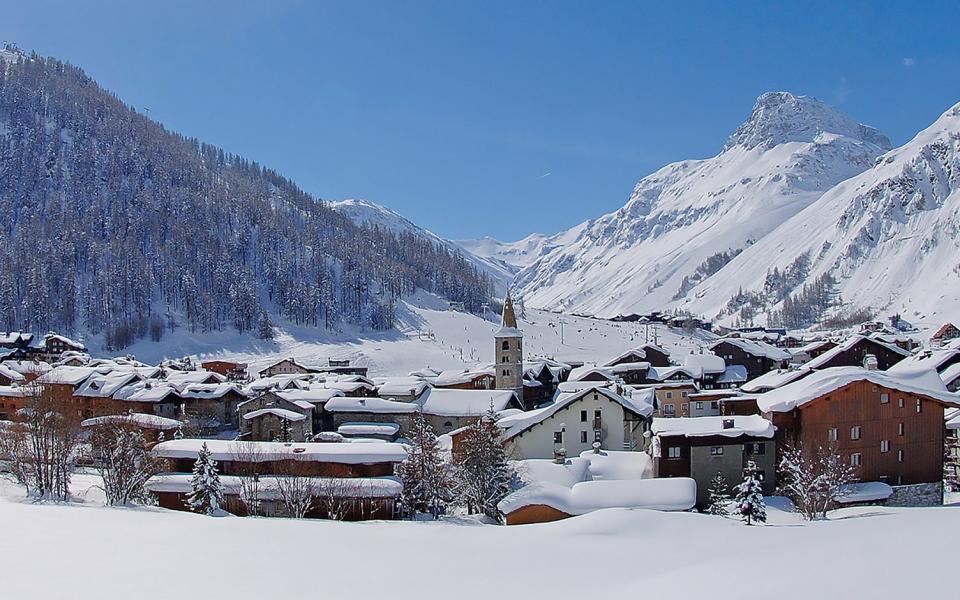
What employers are looking for
There are three credentials all companies expect from potential candidates; enthusiasm, confidence and a professional attitude.
Some of this is obvious – being punctual, polite, well-turned out and having some basic language skills all goes a long way. Also, making it abundantly clear that you are prepared to knuckle down and work hard rather than expecting a winter-long jolly is always a good idea. Remember to keep your CV up to date and demonstrate what you can offer employers that is unique.
A spokesperson from Crystal Ski Holidays says: “We love people with confidence, from all walks of life, with an ability to think on their feet.
“Applicants with previous customer service experience who are fun, enthusiastic, energetic, friendly and professional are just what we are looking for.
“Being social media savvy is a plus. “We want our overseas resort teams to be engaged on social media too, regularly tweeting updates about snow conditions, current and upcoming events or perhaps an amazing photo they caught while out skiing.
“A passion for working and living in the mountains is a must, with ability or interest in learning to ski and/or snowboard as applicants’ free time outside of work will involve lots of winter sports activities.”
Those thinking beyond the upcoming winter can also make use of the summer months as a key to gaining experience. “It’s worth considering summer jobs that could then become winter jobs; many of our colleagues in the Tui summer lakes and mountains and beach destination teams become ski reps in the winter. It’s a great way to develop the core skills you need as a winter holiday rep or team leader.”
With the changes to employment and added red tape for British staff, already having the right to work in your chosen country, or an EU passport, is becoming even more appealing to prospective ski employers.
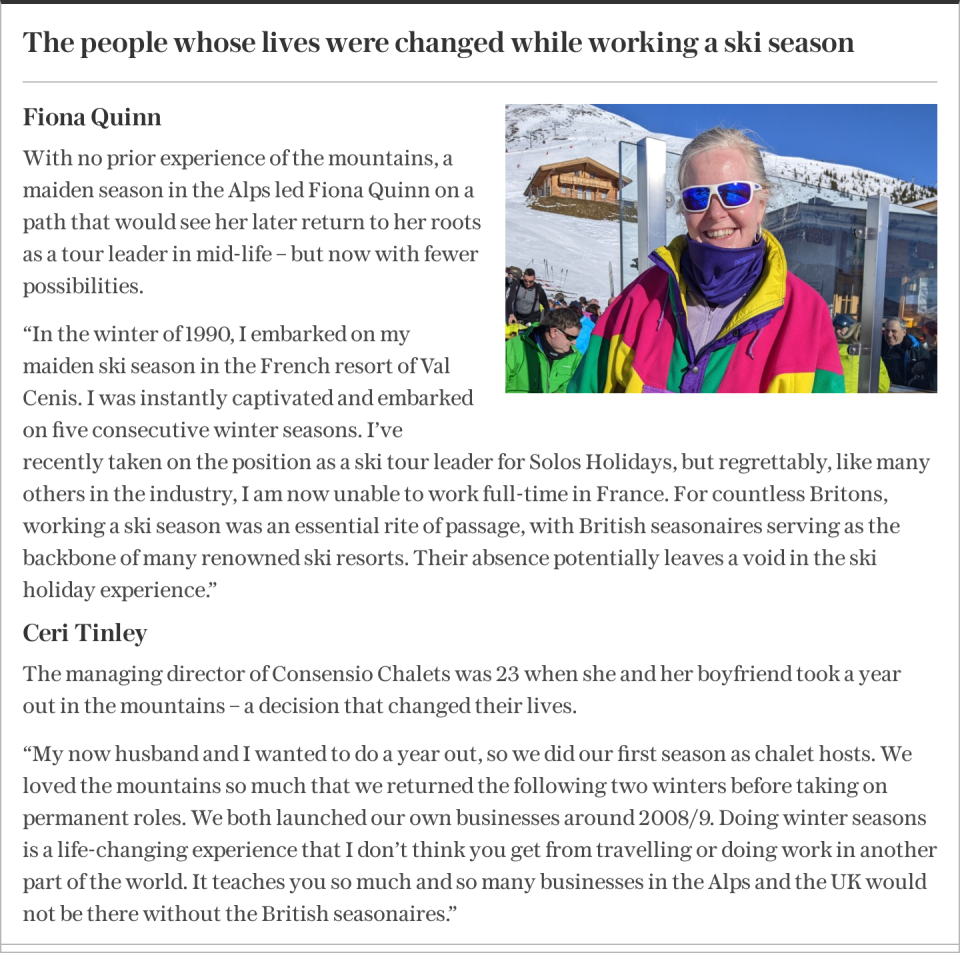
The interview process
Each company will have their own recruitment process, but some of the bigger tour operators, such as Crystal Ski, traditionally have group assessment days. In these, applicants are put through their paces in a variety of individual and group tasks. These assess team work, public speaking, logic and language skills.
The important thing is to be confident and personable without taking over. “And our best tip for interviews… don’t fight for the limelight but make sure you shine by demonstrating good listening skills and interacting well with other candidates,” says Crystal.
Also, don’t worry about being a world-class skier: “We do like previous ski or snowboarding experience, but it isn’t essential – being friendly and professional are.”
Getting advice
There are numerous online portals that share blogs from experienced seasonaires and forums offering guidance, resort information and roles details. OutdoorJAC is one such site and has an online directory of the latest job opportunities from a variety of companies.
For those considering heading across the pond for a season, BUNAC is a hub of advice and can help you secure a job through its Work Canada programme, which offers job support and help with interviews and application, job fairs, assistance with permits and visas and social events when out in resort for its members. If you are considering a season in Canada it’s important to know that all workers require a IEC work permit, which allows eligible British passport holders aged 18 to 30 the chance to live and work in Canada for up to 24 months – many companies will favour applicants who have had their visa confirmed and looking for work.
This article was first published in July 2021, and has been revised and updated.


